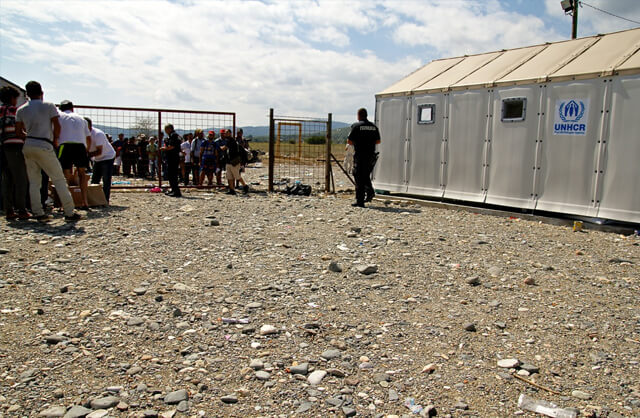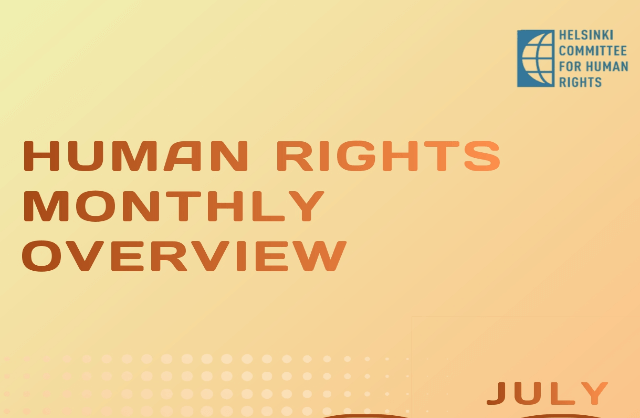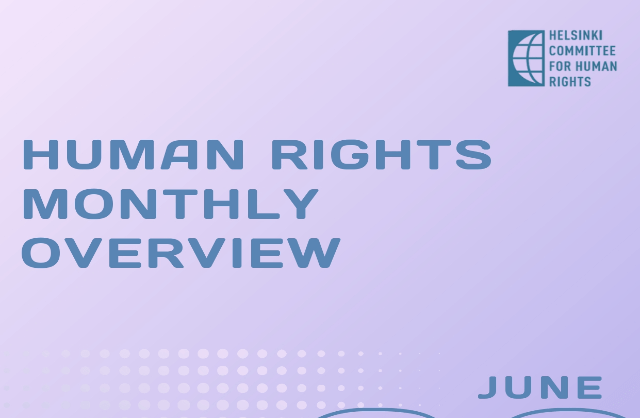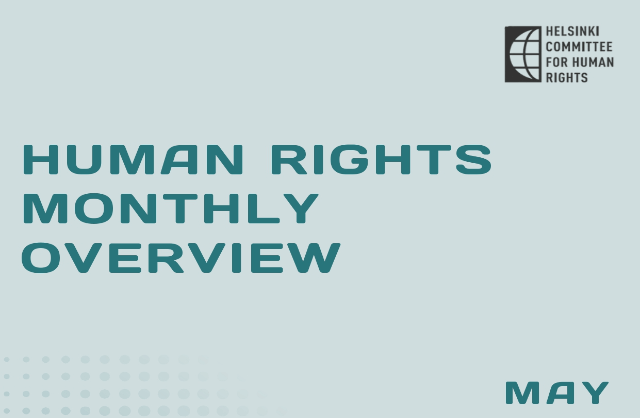The situation at the border crossings Gevgelija and Kumanovo for the period: 15.02.2016 – 21.02.2016
February 24, 2016

The weekly report on the situation at the border crossings Gevgelija and Kumanovo includes the following topics: Available facilities and conditions at the camp and Institutional treatment.
Gevgelija
Available facilities and conditions
4,465 refugees were registered in the course of this week, which is 65% less compared to last week, when a total of 12,602 refugees were registered. The decline in the number is mainly due to the new agreement achieved by the states along the refugee route, i.e. Macedonia, Serbia, Croatia, Slovenia and Austria, on the 18.02.2016 in Zagreb, Croatia.
With the new decision, the main check-up (profiling) and registration of the refugees will take place at the Greek-Macedonian border, where a document will be issued which will be valid for all the border crossings further down the refugee route. Consequently, police officers from all the said states, as well as FRONTEX shall be deployed at the border. Only the refugees originating from an area of crisis who can prove their identity with a passport, an ID or another document, and who at the same time possess Greek documents, will be allowed to cross the border. This decision became effective as of 19 February, and since thenS the refugees who are unable to prove their identity have been stopped at the border and prevented from crossing.
With a donation from UNCHR, television sets have been set up in each of the tents in the camp. There is a functioning sound system in the camp which was set up some time ago through which the train arrival and other useful information for the refugees in the camp is provided in several languages. Due to the bad hygiene maintenance in the camp, the refugees often clean the tents themselves.
Four new containers have been set up near the train platform, adding up to a total number of 8 tents. The toilets which are being built in the vicinity of the tents are in their closing stage and will soon start functioning, as well as the toilets built in front of the camp.
Institutional treatment
Bearing in mind the new rules for refugee registration, the registration and profiling process continues to take much more time than before. Furthermore, with the introduction of the new rules, there is an increasing number of cases of detailed search of the refugees, who are also often held up for a talk with the police officers.
The Helsinki Committee expresses concern over the low number of women police officers deployed in the camps on the border crossings, where women are often checked or searched. So far, we have spotted male officers searching women on several occasions.
The Helsinki Committee urges for an increased and regular presence of women – in the capacity of official persons (police officers).
Kumanovo
Available facilities and conditions
One of the tents in the camp has recently been equipped with 100 beds which the refugees can use to stay overnight if they desire so. In addition, the setting up of new toilets and showers is under way.
None of the camps offer a special prayer room, in order for them to exercise the right to religious rites, so the refugees are forces to refrain from prayer, or pray wherever they see fit.
The Helsinki Committee proposes that an adequate, separate prayer room be provided.
Institutional treatment
There is an increasing number of cases of “economic migrants” in the camp who have been sent back from the Serbian side due to illegal documents, as well as “economic migrants” who have been sent back from Tabanovce to Gevgelija. Some are getting deported to the Greek side, but some of them scatter around in the nearby villages, in search of illegal roads to continue their way.
On the 19.02.2016, around 360 refugees from Afghanistan were prevented from crossing the Serbian birder. As a sign of protest, they spent several hours standing in the rain, refusing any kind of help, food or clothes. When they realized that their protest was bearing no fruit, they were forced to take shelter in the tents due to the low temperatures. They were given medical and humanitarian aid. On that same day, a train from Gevgelija brought another 290 refugees, also from Afghanistan, to the camp, who in lack of information as to when they will be allowed to transit, stayed in the camp. On the following day, around 709 refugees from Syria and Iraq were allowed to move towards Serbia, while the 650 refugees from Afghanistan had been stranded in the camp for two days already.
The Helsinki Committee warns that the camp in Tabanovce is not designed for longer stays of refugees, nor does it possess the capacity for adequate sheltering of a higher number of people. Therefore we urge the competent institutions to find a solution for rapid transit of the refugees and avoid having them stay in the camp in Tabanovce for longer periods of time.
Towards the end of the week, 15 people originating from Libya were found on a cargo train who, in Greece, had been tricked into believing that the train would take them directly to Belgrade and had paid 200 EUR per person. The border police accompanied them to the camp, where they were provided with medical and humanitarian aid.
It is of great concern that, towards the end of the week, several refugees who wanted to ask for asylum were spotted in the camp, but the officials turned a deaf ear to their request. They resorted to excuses that they had run out of asylum request forms at that moment, or that the police officer in charge of asylum issues had not been present, thus leaving the refugees stranded in the camp for 5 days.
The Helsinki Committee appeals for a rapid solution of their status and warns that the refugees should not be deprived of their right to seek asylum in our country.

This report is made possible by the generous support of the Foundation Open Society Institute (FOSI) within the project „Improvement of the rights protection for migrants and asylum seekers in the Republic of Macedonia“. The contents are the responsibility of the Helsinki Committee for Human rights of the Republic of Macedonia and do not necessarily reflect the views of FOSI.


